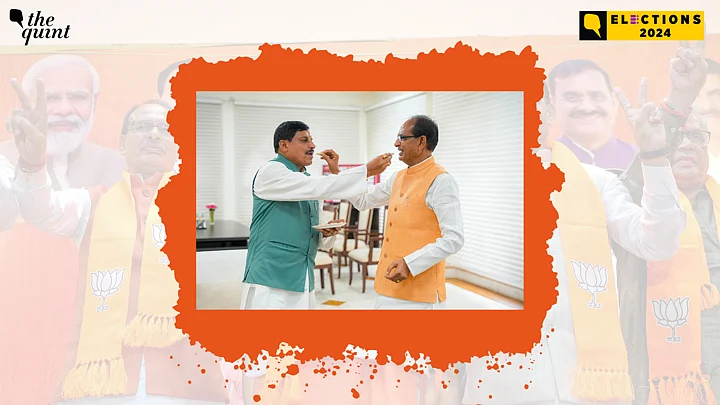The Bhartiya Janata Party has won all 29 seats in Madhya Pradesh, making a clean sweep.
Before the elections, the party unit had promised a garland of 29 lotuses (BJP’s symbol) which it delivered.
Reacting to the victory, Chief Minister Mohan Yadav said, "logon ne BJP ko chappar phad ke vote diye." (The people voted for BJP in abundance.)
Yet, the celebrations at Deendayal Parisar, the state BJP headquarters, were apparently missing something.
“Obviously, we are disturbed by the national tally of the BJP. Still, we are very happy, the contribution of the state meant a lot at this juncture,” a senior party leader commented.
He was correct. Imagine the BJP’s tally minus 29 lotuses from the heartland. But what surprised the state leadership were the results from the two neighbouring states of the Hindi heartland – Rajasthan and Uttar Pradesh.
The explanation from some BJP leaders on their performance there was interesting.
But first, a note on the BJP’s huge victory in Madhya Pradesh.
MP Performance Makes Mohan Yadav Stand Out
Making a record of sorts, the Lok Sabha seat in Indore witnessed a unique result. Though candidate–less Congress’s appeal seemed to have worked after people polled 2,18,674 votes in favour of NOTA, BJP’s Shankar Lalwani won the seat by a massive margin of over 10 lakh votes.
In a dramatic turn of events before the polls, the Congress party's candidate Akshay Kanti Bam withdrew his name from the fray on 29 April and went ahead to join the BJP.
Rather than extending its support to any of the candidates who were still in the battle, the Congress decided to campaign for NOTA.
Former Chief Minister Shivraj Singh Chouhan won with a huge margin of 8,04,852 votes, Jyotiraditya Raje Scindia won with a margin of 5,40,929 votes, and the state BJP president VD Sharma with another big margin of 5,44,915 votes from Khajuraho where the nomination form of the INDIA bloc candidate was rejected.
CM Yadav said, “We have won eight seats with a margin of more than four lakh votes.”
Though the BJP may analyse later the usefulness of his Yadav surname in Uttar Pradesh and Bihar, he did deliver in Madhya Pradesh. His performance in MP is a feather in his cap, especially in view of the performance of Yogi Adityanath, the hardcore Hindu face in UP, and Bhajanlal Sharma, the CM of Rajasthan.
Yadav camped and campaigned in Chhindwara, along with senior party leader Kailash Vijaywargiya, to ensure that the saffron surge topples the forte of Kamal Nath.
The BJP’s Vivek Bunty Sahu won the seat with a margin of over 1.3 lakh votes defeating Nakul Nath, Kamal Nath's son. Chhindwara remained a bastion of Kamal Nath since 1980. The family won as many as 13 elections from the seat since then (11 Lok Sabha and three Assembly polls).
In Rajgarh, the party bigwig and Rajya Sabha member Digvijaya Singh lost with a margin of over 1,20,000 votes.
Caste Politics in MP Is Unlike Anything in Other States
But what makes Madhya Pradesh different from the other neighbouring Hindi states?
Caste politics.
Though Madhya Pradesh has a 15.60 percent presence of scheduled castes, they are not concentrated in large numbers to make or break a candidate.
“Unlike Uttar Pradesh and Rajasthan, the caste politics sentiments are not strong in Madhya Pradesh," a BJP leader explained.
Besides, the characteristics of an average voter of MP are different from those in Bihar and UP.
In UP, another party leader explained that Dalit voters seemed to have shifted to the Samajwadi Party and to some extent to the Congress.
In Rajasthan, the caste politics swung in favour of the Congress.
Among other issues, he said, the “bulldozer politics and arrogance factor” also went against the party.
Politicians in MP also tried to imitate the “bulldozer” politics but not to the extent it was done in UP, he maintained.
Besides, the saffronisation of tribals in Alirajpur, Dhar, and Jhabua also went in favour of the party.
“The BJP’s scheme of pitching Hindus against Muslims worked at many places. Its Hindu tribals versus Christian tribals or the Church worked in places like the tribal-dominated districts of western Madhya Pradesh to Bastar in Chhattisgarh,” an RSS functionary who worked closely in MP and Chhattisgarh claimed.
Following a resounding BJP victory in the assembly elections a few months ago, followed by the equally impressive success on all the 29 Lok Sabha seats in Madhya Pradesh, the political career of some senior Congress leaders is now coming to an end and the party is headed for a generational change.
These include Kamal Nath and Digvijaya Singh, who had already told the voters in Rajgarh that this was their “last election.”
For the BJP, Shivraj Singh Chouhan, after his initial no-no for Delhi last year, will have to move to the national capital.
As he vacates his Budhni assembly seat, will he be able to get a ticket for his entrepreneur son Kartikey Singh Chouhan in the coming by-elections, especially in the backdrop of the party’s narrative of vanshvaad ki rajniti?
(The author is a senior journalist based in Madhya Pradesh. This is an opinion article and the views expressed above are the author’s own. The Quint neither endorses nor is responsible for them.)
(At The Quint, we question everything. Play an active role in shaping our journalism by becoming a member today.)
